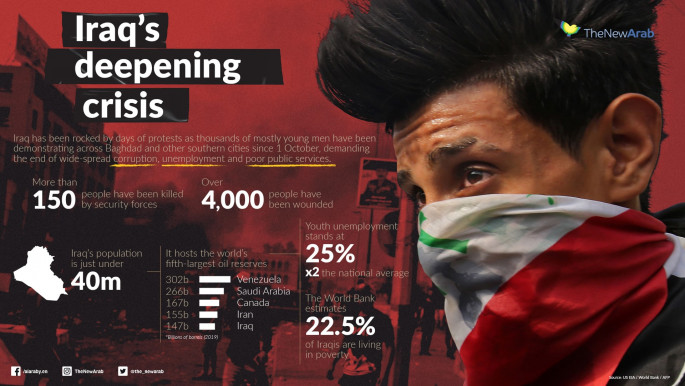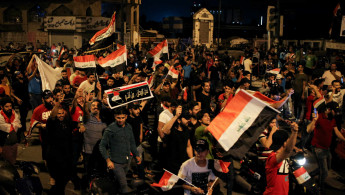Iraq protesters advance towards Green Zone in defiance of security push
Despite the authorities’ heavy security deployment around the Green Zone, including blocking off key bridges between downtown’s Tahrir Square and the special zone, which houses key government buildings and foreign embassies, protesters managed to breach some of the barricades.
Videos circulating social media purported to show dozens of demonstrators on al-Jumhuriya bridge, which had earlier been shuttered ahead of Friday’s planned protests.
Other clips showed protesters clad in national flags walking towards the iconic arch at the entrance to the diplomatic district, however security forces used tear gas and hot water cannons, preventing the crowds from entering the diplomatic zone.
At least one protester was injured, according to local reports.
A sit-in camp was also erected in Tahrir Square in the early hours of Friday.
The US embassy in Baghdad, which is located in the Green Zone, issued a security warning about the demonstrations to its citizens on Thursday night.
Twitter Post
|
“Large-scale demonstrations expected to take place October 25, 2019 after Friday prayers. US citizens may see heavy police presence. As with prior demonstrations, road closures throughout major cities, including the Baghdad International Zone, likely,” it said in a tweet.
Twitter Post
|
Hundreds took to the streets following a speech by Prime Minister Adel Abdel Mahdi, in rallies that have spread quickly across the capital and in other cities in the south.
Reports on Friday morning said protest marches had spread across the capital, including to the neighbourhood of al-Harithiya, which borders the Green Zone.
Abdel Mahdi addressed the nation in the early hours of Friday morning, vowing to make a cabinet reshuffle next week and proposing a sweeping reform package - the fourth in less than a month - promising to combat corruption and cut government spending.
Read more: Deadly protests engulf Iraq, but what has ignited this rage?
"Next week, we will make a cabinet reshuffle away from quotas, focusing on competencies, ministerial autonomy and a growing presence of women and youth," Abdel Mahdi said.
In his televised speech, the premier warned that the resignation of the government without a constitutional alternative would leave the country in chaos.
He said involving the armed forces in suppressing street demonstrations was "a big mistake".
“Iran get out!”
Rallies that began on Thursday evening issued calls for the country's entrenched political class to be "uprooted", calling them “all thieves”.
Twitter Post
|
Anti-Iran sentiment also characterised the latest demonstrations, with chants of: "Baghdad is free, Iran get out!", as well as “Qassim Soleimani get out of our country,” referencing the chief of Iran’s Revolutionary Guards who hold sway over powerful Shia militias in Iraq.
Protesters and government officials alike have accused Iran and other foreign powers of interfering in the movement.
Demonstrators also demanded the leader of the Shia PMF militia, Faleh al-Fayyadh, disclose the names of snipers thought to be responsible for killing dozens of demonstrators during protests earlier this month.
In the southern city of Nasiriyah, demonstrators said they would remain in the streets "until the regime falls".
Sadrist support
Influential cleric Moqtada al-Sadr gave his supporters the green light to resume protests on Friday, which marks the anniversary of Prime Minister Adel Abdel Mahdi's government taking office.
October 25 also marks the deadline issued by the spiritual leader of Iraq’s Shia majority Grand Ayatollah Ali Sistani, for the government to respond to protester demands.
Demonstrations erupted in the first week of October with calls for an end to widespread corruption and unemployment, then evolved into demands for a political overhaul.
 |
|
| Click to enlarge |
But they were met with a tough response, with 157 people killed in six days, according to a government toll.
Ahead of the planned protests, the country was on a knife's edge on Thursday, with many stockpiling food, petrol and other supplies.
The United Nations had urged the government to "draw lessons learned" from the earlier bloodshed.
But Thursday's demonstrations began ahead of schedule and appeared to be peaceful, with no reported incidents of violence.
Interior Minister Yassin al-Yasseri was in Tahrir Square to reassure protesters that security forces would "protect" them, his office said in a statement.
Agencies contributed to this report.
Follow us on Twitter: @The_NewArab





 Follow the Middle East's top stories in English at The New Arab on Google News
Follow the Middle East's top stories in English at The New Arab on Google News
![Israeli forces ordered bombed Gaza's Jabalia, ordering residents to leave [Getty]](/sites/default/files/styles/image_330x185/public/2176418030.jpeg?h=a5f2f23a&itok=_YGZaP1z)

